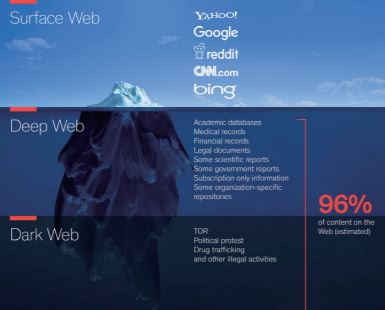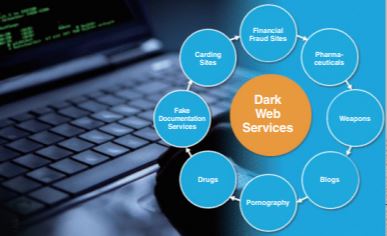The number of Korean users who access Tor, the most infamous anonymous browser that can connect to the dark web, has tripled from 5,156 per day at the end of 2016 to 15,951 on July 11th. The dark web is an encrypted anonymous Internet network that cannot be indexed by a normal Internet search engine. It is also considered to be a hotbed for various cyber-crimes including counterfeiting and illegal video uploading. As the cyber-space expands with the development of science technology, the Sungkyun Times (SKT) is now going to discuss the dark web, the main source of cyber-crimes.
What Is the Deep Web and How Does It Work?
What Is the Deep Web?
Internet space is largely divided into two categories: the surface web and the deep web. The surface web is the usual web that is visible and accessible for all Internet users. The surface web consists of legitimate content indexed by search engines like Naver and Google. Since the surface web is open to the public, everyone can directly access the website they want by entering a search term in the search engine. The surface web, however, is just the tip of the iceberg and there is a bigger unknown space: the Deep Web. It is an encrypted secret web which is invisible for normal users and is difficult to be indexed by typical search engines. Also, the deep web is only accessible through a specific Internet browser that permits authorized users. Generally, the deep web anonymizes and protects the user’s identity and Internet Protocol (IP) addresses by using a layered encryption system. The deep web washes a user’s IP address when it delivers data by going through several encryption medium layers. It makes users anonymous and untraceable. Due to these characteristics, the deep web is also used as a channel for political expression in countries with high Internet censorship and conduit of well-intentioned whistleblowers.
How Does the Deep Web Work?
The deep web hides the identites and activities of the website’s users by using multiple layers of an encryption system. In the deep web, all the data can reach it’s destination by passing through a randomly selected medium layer server. The deep web’s traffic is randomly directed and since each relay only knows the previous and the next relays, the overall connection route is untraceable. Users need a special configuration of software to access the deep web such as Tor’s onion routing encryption system that resembles the structure of an onion.

The Deep Web’s Double-edged Sword of Anonymity
The initial developmental purpose of the deep web was to use the Internet freely without being monitored by controlling organizations like the government. Desires for anonymity have led to the development of Tor by the United States (US) Naval Research Laboratory employees who were seeking to protect the internet user’s privacy. Despite the deep web’s primary function and purpose, which are ensuring users’ autonomy and protecting their privacy, it is widely used as a hotbed for criminals under the name of the dark web. The dark web is a concept that is differentiated but also included in the deep web. In these dark web’s markets, illegal products such as counterfeit bills, drugs, illegal videos, and chemical weapons are traded through bitcoin, which makes it even harder to trace. The illegal market of the dark web is so serious that bitcoin payments on the dark web are expected to reach one billion dollars this year. According to the survey conducted by Senator Song Hee-kyung of the Science, ICT, Broadcasting, and Communications Committee, 1,547 illegal websites including drug trafficking, illegal financing, and illegal pornography are distributed in Korea through Tor. It means that Korea is not safe from the dark web. According to S2WLab, a Korean dark web analysis company, Koreans’ credit card information have already traded on the overseas dark web and this personal information, including credit card numbers, names, and addresses of the card owners can be purchased for only about 20 dollars.
Current Regulation Status of the Dark Web
As various crimes are committed through the dark web, many countries, including Korea, are trying to take action against illegal activities. China and Russia, which have strong government control over the Internet, have taken steps to block the dark web. For example, “the Great Firewall of China (GFW)”, a Chinese Internet website blocking program, blocks users who use Tor to access the dark web. In Russia, a law which is to ban web browsers that can access the dark web was passed in July 2017. Besides this, Russia’s internet service providers are obligated to immediately block access of Internet users who try to use dark web browsers. Currently, however, due to the anonymous nature of the dark web, regulation of the criminal activities on the dark web is not considered that effective. When considering these limitations of regulations, investigation agencies need to strengthen their capabilities to detect anonymous cybercriminals. For example, in the US, the Federal Bureau of Investigation (FBI) developed a new technology in 2013 that can accurately detect criminals who access child pornography websites through the dark web without monitoring those legitimate deep web users. Korea needs to develop security and investigative techniques that can accurately detect criminal acts while also protecting the privacy of legal deep web users by taking a leaf out of those overseas cases.

As various crimes are committed through the dark web, many countries, including Korea, are trying to take action against illegal activities. China and Russia, which have strong government control over the Internet, have taken steps to block the dark web. For example, “the Great Firewall of China (GFW)”, a Chinese Internet website blocking program, blocks users who use Tor to access the dark web. In Russia, a law which is to ban web browsers that can access the dark web was passed in July 2017. Besides this, Russia’s internet service providers are obligated to immediately block access of Internet users who try to use dark web browsers. Currently, however, due to the anonymous nature of the dark web, regulation of the criminal activities on the dark web is not considered that effective. When considering these limitations of regulations, investigation agencies need to strengthen their capabilities to detect anonymous cybercriminals. For example, in the US, the Federal Bureau of Investigation (FBI) developed a new technology in 2013 that can accurately detect criminals who access child pornography websites through the dark web without monitoring those legitimate deep web users. Korea needs to develop security and investigative techniques that can accurately detect criminal acts while also protecting the privacy of legal deep web users by taking a leaf out of those overseas cases.
While the expansion of the cyber world makes our daily lives more convenient, it also diversifies the distribution channels of criminal information. Among these, on the dark web, serious and diverse criminal information is circulating. It is important to deal with criminals after they have committed crimes, but technical precautionary measures and strong government policy should be the top priority.
